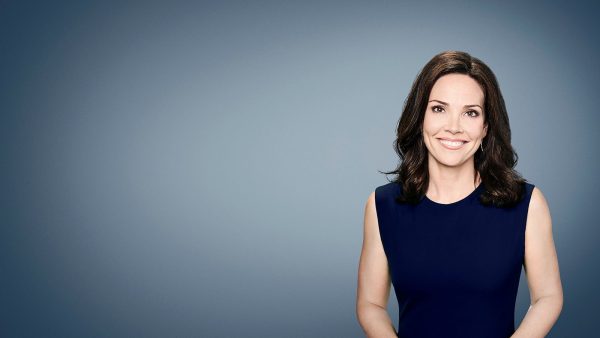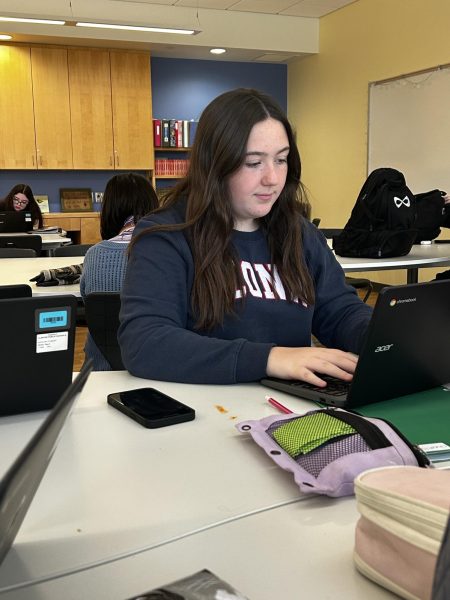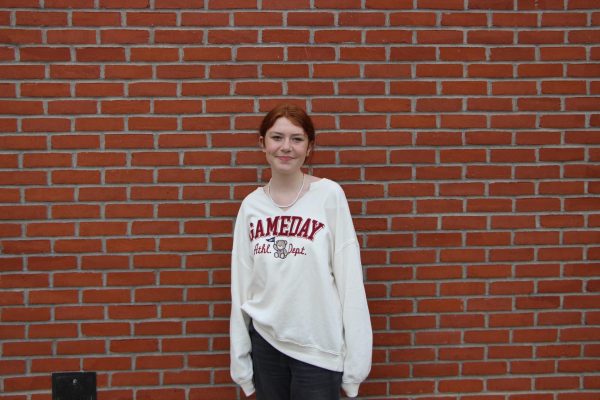Erica Hill, an anchor and correspondent for CNN, sits down to prepare a story that millions of Americans around the world will watch. Libby Burns, a sophomore at The Morgan School sits down at her desk to complete her bi-weekly PawPrint article for the local community. Both these reporters are ready to take on the world with their voices. The Pawprint sat down with each of the reporters, and listened to them sharing how they go about their life as a journalist.
BECOMING A JOURNALIST
The first step into stepping into the shoes of a reporter is having a moment in your life that leads you into the career choice of journalism. Hill spoke about how she fell into journalism after taking a class at Morgan as a 1994 graduate. She did not plan to go into journalism after college. “I went to college not really knowing what I wanted to expect. I wanted to travel.”
Hill went to Boston University, and there she transferred into the College of Communication, because it was something that she enjoyed. “I’ve always loved to write. I’m very curious. I ask a lot of questions, and I thought that would be a good fit for me.”
During one of her classes, a professor pulled her aside and asked her if she ever thought about doing journalism. Hill then shared that she enjoyed taking journalism classes. She quickly became friends with people in a broadcast journalism program, who would go around Boston with video cameras and shoot stories, and she soon fell in love with the art of storytelling. Hill then majored in broadcast journalism, n
ever intending to be on TV. “I liked really honoring that whole process and seeing it through from start to finish.”
Libby Burns stated that nothing really inspired her to start her journalism experience. She did however take the class last year when she was a freshman, which started her passion for journalism and being a reporter, “I decided to take it this year to continue getting better at writing and taking pictures.”
One of the main reasons why Burns decided to stick with journalism was wanting to get better at it, as well as enjoying the class last year. She also plans on taking a job in sports journalism or sports social media, “The class gives me the opportunity to help me make a career choice and help me get better at reporting and covering sports.”
A DAY AS A REPORTER
Work routine is also a big part of being a reporter, Hill stated that she does a lot of reading. “In a lot of ways, I’m studying for a test every single day, which I really enjoy. I love learning, and that’s one of the things I love about my job. It’s different every day.” Hill shares that she checks a lot of different news sites for research, and the number of notes that go out internally.
“I’ll see what I’m assigned for the day, so if I’m anchoring, what stories that we’re covering, and who are our guests.” Hill talked about how filming a news segment is a team effort, saying that even though a few people are on the screen, there are so many people that make it happen behind the scenes.

Credit: CNN
“I’ll start getting into scripts. I’ll start scripting my questions. I will talk to the producers about some of the elements that I want to use.” Hill also shares that she has four TVs in her office, which all have different news stations on them, so she can constantly read up on what she is covering. After finishing up a show, they prepare for the next day or just follow up on things that have happened, just to make sure she is constantly on the tip of the news.
At Morgan, Burns shares that she has a lot of responsibilities as an editor in her class. Being an editor means that Burns has to go through all of her teams’ articles, and makes sure they are good to send off to the Journalism advisor, Eric Carroll. “During classes, I typically try to make sure all my reporters are on track for their deadlines and make sure the social media is all set up for the week. At home or during study hall, I will write my article.”
Burns also shared her role as an editor for the PawPrint. “I make sure all the articles are up to the PawPrint’s standards and then send it to Mr. Carroll for final approval.” Burns also talked about wanting to make sure posts for the PawPrint’s social media platforms are regular and presentable for viewers. She shares that the Pawprint’s Instagram posts Weekly Updates, Club Highlights, Weekly Highlights, and Athlete of the Week.
PREPARATION FOR INTERVIEWS
As an anchor for a national news network, Hill is the person on the TV screen sharing news about the world to her audience. She films different segments for CNN, and gets information for them by interviewing people who know information about it.
When Preparing to interview someone, Hill shares that she does prior research before the interview. She will read up on people’s backgrounds, and what is their part of the story they are going to tell the audience. “You want to understand the reason that you’re booking this person, and then you really want to understand where they’re coming from, because you don’t want to waste their time. I want to come up with smart questions that will get important answers for my viewers.” Hill also stated that she wants the person she’s interviewing to know they are appreciated, and she respects the fact that they took the time to be interviewed.
However, it is different if the situation is a breaking news situation. “People just get thrown to me. They’ll say, ‘Erica this is happening,’ and I’ll have a producer in my ear, and they’ll tell me who I am talking to.” She shares, “Sometimes I don’t know a lot.”
Hill talked about the people she has interviewed in the past, which included former presidents and politicians, as well as many different actors and chefs when she was on the Today Show.
When Burns was asked about her preparation for interviewing, she stated, “Before I interview someone I come up with the questions I will ask them, and contact the person to find a time that I can interview them.”

“I typically will email and reach out to people that I want to interview, and I set up a time.” Burns shared. She also reveals that she can sometimes struggle with finding good questions to ask the people she is interviewing, because she wants to make them good for her article. “ I struggle to find questions, because it is sometimes hard to find what information to use.”
IMPORTANCE OF JOURNALISM
Hill talked about why she thinks it is so important to report on the issues around the world, she stated she thinks it is important that people are smart about where they get their information and “if something sounds too good to be true, it probably is.”
“I believe journalism is important because it holds the powerful to account, which is key.” Hill stated
When Burns was asked about the importance of journalism, she talked about the importance of it around Morgan. “I think it is important to report on things around the school to keep everyone informed and continue to connect with the Morgan Students.”
ADVICE TO UP AND COMING REPORTERS
Even though both these reporters became journalists in different ways, that doesn’t mean that they both don’t share the same goal of educating people around them and sharing information. Both Hill and Burns concluded with advice to young journalists who plan on joining the Journalism class at Morgan or becoming reporters.
“Be curious, but also be smart about where you’re getting your information, and do your homework.” Hill shares to the up and coming reporters.
On the Morgan side, Burns advised, “Keep working hard, because we are creating something great.”



